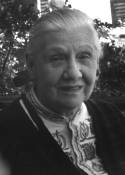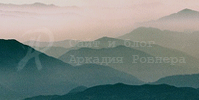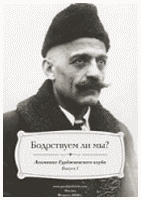Loise Welch

Born in New York of Ukrainian immigrant parents in l905, Loise Welch was taken in reluctantly by her grandparents when her mother died soon after. They told her they were her parents and left her largely alone, though she was visited infrequently by her father, who was introduced to her as an uncle. Deceit and half-truths were hidden in every family relationship, and her happiest childhood memories were from outside the home.
Forced to leave school at twelve and work wrapping parcels in the basement of Strawbridge & Clothier, a large department store, in order to bring home money for the family, she became seriously anemic. Luckily she was cared for by a friendly doctor who insisted she was not well enough to return to work, and sent her back to school.
In her early teens a psychologist took an interest in her exceptional intelligence, conducted experiments with her and even asked to adopt her, but by then Loise had had enough of pseudo-parents and refused.
Loise was a part of the reporting staff Rochester Democrat. She was hired a few years later by the New York American, becoming in her early twenties both fashion editor and “Mother Manhattan,” who provided advice to the lovelorn.
In those exciting years of the late 1920s she thrived among New York’s intellectual elite and met her journalist first husband on the upper deck of an open-top Fifth Avenue bus on the way to a lecture by A. R. Orage, the well-known English editor. Orage became a father figure to her and introduced her to the teachings of G. I. Gurdjieff.
Abandoned by her first husband a few years later during the depression, she had two young children to raise and began writing advertising copy for Benton & Bowles in 1934. There she met William J. Welch, an up-and-coming adman, but held off marrying him for seven years, not wanting a family of three to burden his career shift when he decided to chuck advertising and go to medical school.
In l936, Mother was appointed director of the writers’ project of the Work Project Administration for the state of Connecticut. When she moved to New York with her new husband in 1941, she continued to write books and articles, but her deepest interest was now focused on the Gurdjieff teaching. She attended P. D. Ouspensky’s lectures in New York and later took active part in Mme Ouspensky’s work at Franklin Farms, in Mendham, New Jersey. After Gurdjieff’s death in l949, Mother became one of the leading figures in the newly established Gurdjieff Foundation of New York City and later assisted the founding of similar institutions in Toronto and Halifax. In l982, feeling that Orage had never received the recognition he was due as the principal disseminator of the Gurdjieff teaching in the United States, she wrote a vivid account of those years called Orage with Gurdjieff in America, (Routledge & Kegan Paul) which has been translated into French.
Louise Welch died peacefully in her 95th year with her family gathered around her, as gentle and loving in dying as she was in life. As David Young said at her funeral, “Mrs. Welch had a large family … each one of us felt we had a special place in her heart.”
Articles:
Gurdjieff Movements Demonstration
Here Passages from text of David A. Young “Louise Welch — Essence Friend” are:
“What she said seemed to be very important, and it was not only in her words, but also in her tone of voice. She spoke with authority and compassion, and what she said had the ring of truth. All of her outward manifestations seemed to emanate from a central core of being—of presence.”
“When Mrs. Welch first invited me to take responsibility for a group, she said, “This is work for you. You cannot help anyone. Try to see your lying.” Later I told her that I felt I was not able to carry this responsibility, but she told me this feeling was, in fact, almost a requirement of anyone who leads groups! “But, I feel entirely inadequate! What is my work here?”
Listen to the group. Practise listening. Listen to yourself, and suffer how you are. It is your work. When you begin to awaken, the first thing you will see is your sleep. As you begin to see your mechanicality, your reactions, they begin to have less power. Seeing is our work.”
“She sometimes told us what she called “secrets,” and I remember thinking, “Surely, if she tells us, they will no longer be secrets.” Later, I saw that what she told us was a secret, and it might take a long time before we understood what she had said.”
“She often taught us without words. The care she took in laying the table for a meal affected us, and we would find ourselves later taking the same care when sweeping a floor, or washing dishes. When she watched us as we worked on crafts, or cooking, or construction, it sometimes seemed that she lent us her attention. Seeing that it was possible to work in that way, with care, helped us later to find that quality on our own.”
Here sayings of Loise Welch are:
· I have never felt or seen an effort of work that did not change the atmosphere.
· Real faith is not the opposite of doubt. It is an affirmation of being.
· Without attention I do not exist. Always my attention is taken—by anything, by everything. It is taken. But it can be free. Collect attention, work for attention, learn to place your attention. When I make a serious effort to place my attention somewhere, relaxation begins, energies begin to take their correct place. The way begins to be opened for something other to appear.
· We all have moments of being awake, but we lose them quickly because we don’t value them. Something takes place, but it is out of my control. Something does pierce this shell. How can I know my way to it? If you want to know what this piercing effort is—it is my wish. There are moments when my wish can cut right through the protective armour and touch something real and authentic. Why are we not here—right now? It can happen in the twinkling of an eye.
· In order to be useful to anyone, I have to be. Otherwise I am just a reacting mechanism, a played instrument.
· The ego has strength. It has acted as a lookout for a long time, and has looked after me well. It is self-preservation personified, but self-preservation of the small self. Now the ego begins to interfere with the growth of the Self.
· We are all stronger than we think we are, but not stronger than we imagine we are. I pretend that I am strong, which isn’t true, but the feeling that I cannot, is not true either. Where is my area of choice? It is in the effort of being more attentive, more interested—of giving an objective look at what is going on, while it is going on. This is what I wish—it is a moment of awareness while I am experiencing. The experience is not separate, but it is difficult to talk about it in any other way. It is so simple. It is just being here. Just being.
· For a long time, I measure everything I see in myself against an image of what I think I should be. It is impossible to see from there. If I do see something, I immediately want to change it. I do not want to be like that, and so I do not stay with what I have seen. I must develop the courage to stay with that. Do I really wish to be free, or only to avoid glimpses of my slavery?
· There is something we need to learn about effort: effort is not strain. Maybe I could realize this if my relaxation were deeper. I wish there were a word other than ‘relaxation.’ The closest I can come to is ‘letting go’ of the ego; so that I can touch another layer, a much truer one. Our search is not for miraculous results—not to achieve a result, but to learn a process.
· There is a struggle between my wish to gather my attention and my body’s habit of going on with its associations. I cannot fight directly, but I can draw my attention back to my work.
· Do not try to change. Study. When you work, something drops away of itself.
· When you see anxiety, acknowledge to yourself in your own way how you are, and try not to run away, but to be in it more. Sense it more, see how you are inside, and try to see the distribution of your tensions. Then make a strong effort of relaxation, and try to come to some affirmation of yourself at the end of this.
· Better one five-minute effort that is true and intense, and real, than a whole day of ‘porridgy’ dreaming that you are remembering yourself. Only that which you have earned and verified many, many times, through effort, can be yours.
· The more I see my helplessness, the more I feel the need to be in touch with the source of energy. I begin, thinking I can do the Work. It takes time to see my helplessness. A real cry for help does not fail, but it has to be real at the moment, not in retrospect.
How are we to realize that work is not for what is most delightful, but for being. The change is not a change in dream states, but in being—a change in the harmonious balance which will affect the whole being.






